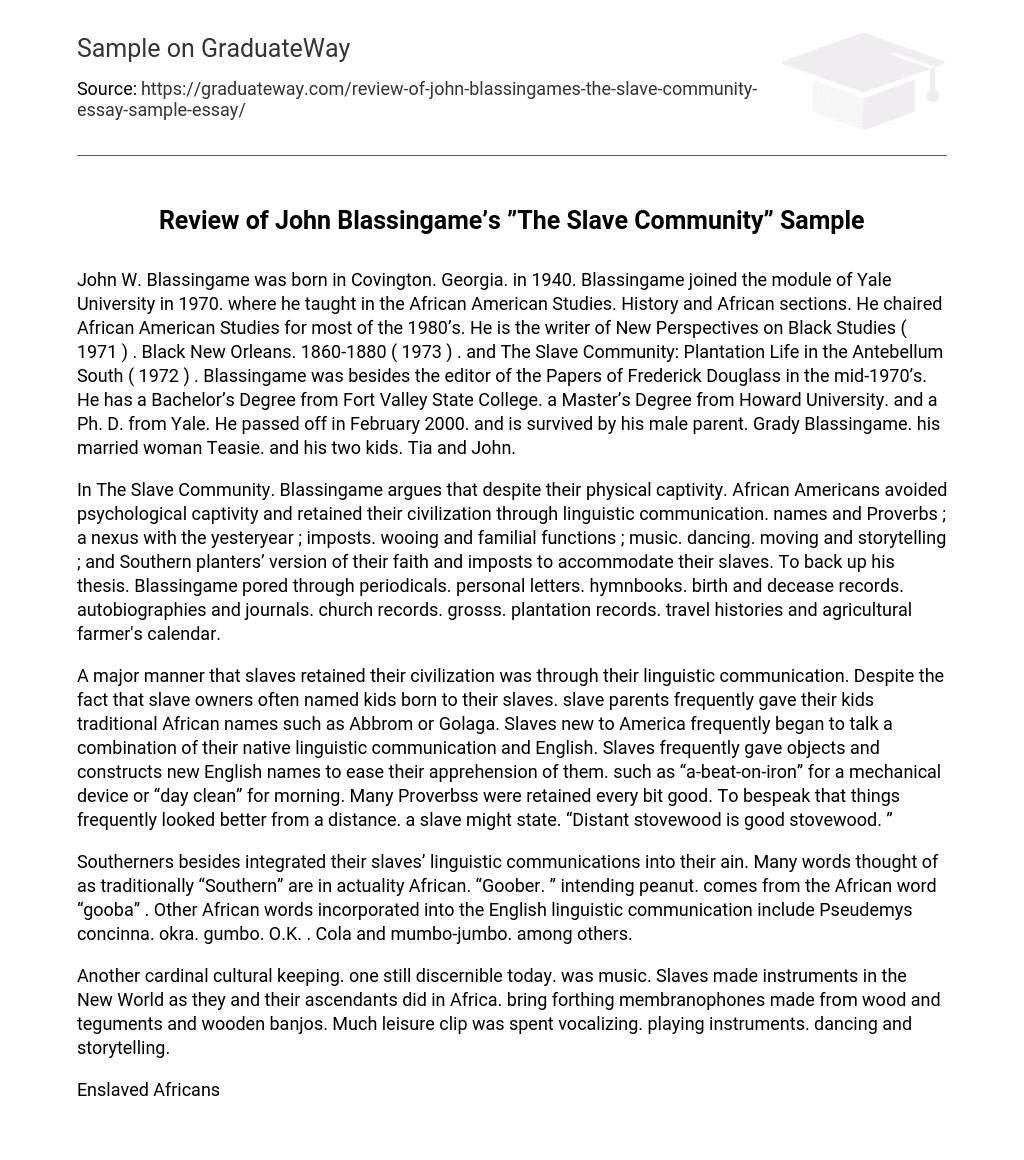John W. Blassingame was born in Covington. Georgia. in 1940. Blassingame joined the module of Yale University in 1970. where he taught in the African American Studies. History and African sections. He chaired African American Studies for most of the 1980’s. He is the writer of New Perspectives on Black Studies ( 1971 ) . Black New Orleans. 1860-1880 ( 1973 ) . and The Slave Community: Plantation Life in the Antebellum South ( 1972 ) . Blassingame was besides the editor of the Papers of Frederick Douglass in the mid-1970’s. He has a Bachelor’s Degree from Fort Valley State College. a Master’s Degree from Howard University. and a Ph. D. from Yale. He passed off in February 2000. and is survived by his male parent. Grady Blassingame. his married woman Teasie. and his two kids. Tia and John.
In The Slave Community. Blassingame argues that despite their physical captivity. African Americans avoided psychological captivity and retained their civilization through linguistic communication. names and Proverbs ; a nexus with the yesteryear ; imposts. wooing and familial functions ; music. dancing. moving and storytelling ; and Southern planters’ version of their faith and imposts to accommodate their slaves. To back up his thesis. Blassingame pored through periodicals. personal letters. hymnbooks. birth and decease records. autobiographies and journals. church records. grosss. plantation records. travel histories and agricultural farmer’s calendar.
A major manner that slaves retained their civilization was through their linguistic communication. Despite the fact that slave owners often named kids born to their slaves. slave parents frequently gave their kids traditional African names such as Abbrom or Golaga. Slaves new to America frequently began to talk a combination of their native linguistic communication and English. Slaves frequently gave objects and constructs new English names to ease their apprehension of them. such as “a-beat-on-iron” for a mechanical device or “day clean” for morning. Many Proverbss were retained every bit good. To bespeak that things frequently looked better from a distance. a slave might state. “Distant stovewood is good stovewood. ”
Southerners besides integrated their slaves’ linguistic communications into their ain. Many words thought of as traditionally “Southern” are in actuality African. “Goober. ” intending peanut. comes from the African word “gooba” . Other African words incorporated into the English linguistic communication include Pseudemys concinna. okra. gumbo. O.K. . Cola and mumbo-jumbo. among others.
Another cardinal cultural keeping. one still discernible today. was music. Slaves made instruments in the New World as they and their ascendants did in Africa. bring forthing membranophones made from wood and teguments and wooden banjos. Much leisure clip was spent vocalizing. playing instruments. dancing and storytelling.
Enslaved Africans besides maintained their imposts after being brought to America. For illustration. familial functions remained the same. with adult females being low-level to work forces and an accent placed on obeisance and regard from kids. much like the familial functions in Western civilization. When slaves courted. they did it harmonizing to traditional imposts: adult females ab initio played “hard to get” whether they were interested or non. and work forces won them over by being witty and blandishing. A adult female could be considered inexpensive if she gave in excessively readily to a adult male.
White slave proprietors besides contributed to their slaves’ keeping of civilization by accommodating to it. Whites integrated African footings into their ain linguistic communication. adopted African music manners ( giving birth. decennaries subsequently. to wind. the blues and rockabilly ) and used African agricultural techniques. Further Africanization of the South occurred when slaves cared for white kids. The kids constantly picked up African Proverbs. footings and attitudes.
Slaves retained their civilization through linguistic communication. vocals. dances. narratives. names. imposts and white Africanization. keeping a sense of psychological freedom in the face of physical captivity.





